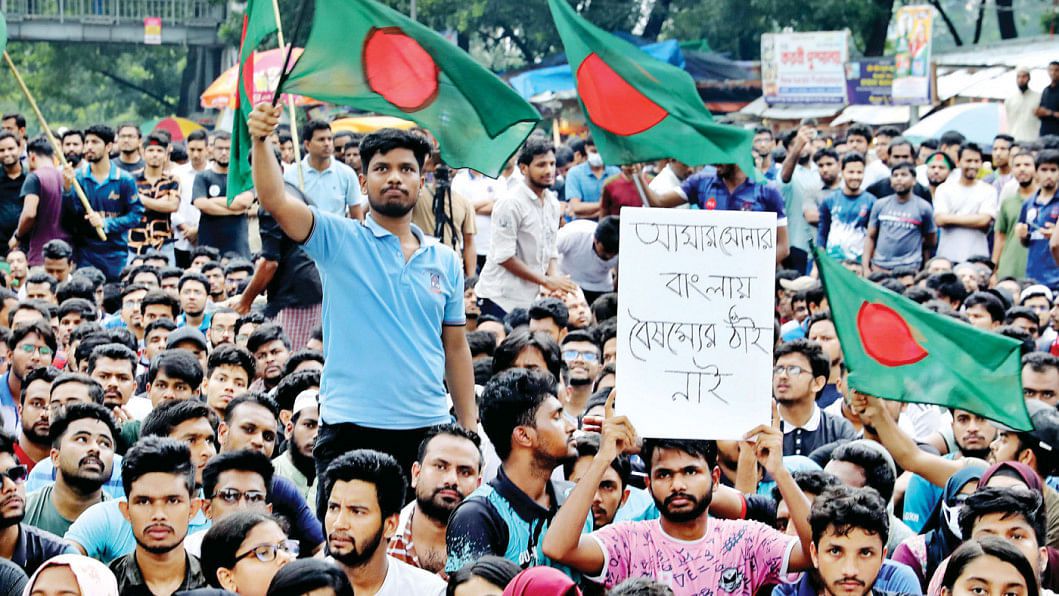We need to move from universal pension to universal social protection system

The implementation of the universal pension, particularly the Prottoy scheme, designed for the employees of self-governed and autonomous institutions, is facing a major challenge due to the indefinite strike by public university teachers. At this juncture, the teachers' concern that the benefits under the new scheme would be lower than existing retirement benefits need to be addressed. Additionally, it is essential to ensure equity across all schemes offered to different groups.
Introducing a contributory universal pension scheme was a key commitment of the National Social Security Strategy (NSSS) adopted in 2015. The government's sincerity in implementing NSSS commitments is commendable. Historically, only government employees in Bangladesh had access to pensions. With the country's recent remarkable economic development and progress toward achieving the status of a developing country, it is time to expand the pension system to all elderly citizens. The universal pension scheme has created such an opportunity by offering pensions to employees of the private sector, informal sector and self-employed individuals. Anyone can register for the new initiative to receive pensions after reaching 60 years of age, including individuals from low-income groups. Participants are required to make monthly contributions during their working years, along with a matching contribution from the employers. The government will make the matching contribution for participants earning less than Tk 60,000 annually.
Yet, the universal pension would be out of reach of the extremely poor, such as day labourers, due to their inability to make contributions. These groups possibly need it most as they cannot save for old age. Many are abandoned by their children due to the shift from traditional joint family systems to nuclear families, making them vulnerable to destitution. The existing non-contributory Old Age Allowance (OAA) programme is intended for this segment of the population. However, the OAA excludes many poor elderly individuals through poverty-based selection, and it is not termed a "pension". To achieve true universal pension coverage, the OAA programme must be declared universal. It should also be rebranded as a "social pension" to demonstrate that the state treats them as valued citizens. The launch of the universal pension has simplified the case for making the OAA universal, especially regarding defining the intended participants and the selection process. The OAA benefits should be available to those unable to access the universal pension, thereby closing the gap in universal coverage. Once universal, a poverty-based selection system will no longer be necessary as the only eligibility criteria would be age threshold to be verified with the National Identity (NID) card, possibly with a proof of residence from the respective local governments.
Implementing universal OAA can be affordable with a modest increase in current allocation and by rolling it out in phases, for example, initially implementing it only in rural areas. Currently, the age threshold for the programme is 62 years for women and 65 years for men. Based on 2022 census data, the rural population in these age groups is estimated at 7.7 million. For 2024-25, Tk 4,300 crore has been allocated for the programme to provide a transfer of Tk 600 per month to six million elderly persons. If all individuals meeting the age threshold are provided with Tk 600 per month, approximately an additional Tk 1,264 crore will be required annually. This additional cost could be spread over multiple years by implementing the programme only in a select number of upazilas each year.
In addition to a phased approach, it is also necessary to reform the social protection budget to secure more funds for transfer programmes for the poor. For 2024-25, 2.43 percent of GDP has been allocated to social protection, but a significant portion of it—Tk 36,500 crore—is designated for the pensions of retired government employees. Another Tk 8,800 crore is allocated for interest subsidies on savings certificates. The universal pension will eventually allow funds for retired government employees' pensions to come from contributions, although this transition may take several years. Consideration should be given to withdrawing the interest subsidy for savings certificates since bank interest rates have increased to levels similar to those of savings certificates. The released funds from these items could be used to roll out universal OAA in urban areas and making other life cycle programmes universal.
Bangladesh has already made important progress toward a universal social protection system, primarily by adopting a life cycle framework that aims to help address vulnerabilities of pregnant women and young children, school age children, unemployed/under employed people, elderly people, widows, and persons with disabilities. Among these lifecycle groups, primary school children have been receiving stipends universally since 2016, regardless of poverty status. The disability allowance programme has achieved universal coverage, though it needs to be formally declared universal, removing the poverty-based selection system.
To achieve a universal social protection system, it is urgent to explore options for the remaining life cycle programmes in line with the above discussion on universal OAA. These programmes are the Mother and Child Benefit Programme, the Food Friendly Programme (to support seasonally unemployed agricultural day labourers) and the widow allowance/Vulnerable Women Benefit Programme. Offering these programmes universally to the defined groups is affordable, if implemented in a phased manner, as proposed above for the OAA. Only by implementing a universal approach can the historical problems around social protection including selection errors, nepotism, and corruption be eliminated. A universal approach also ensures right to social protection and improves trust and loyalty of the citizens toward the state, thus promoting social cohesion.
The first NSSS was marked by adoption of a life cycle approach to address the vulnerabilities that citizens face at different stages of life. The second NSSS, scheduled in 2026, could be marked by adopting a universal approach for life cycle programmes that would ensure social protection for every deserving citizen as committed by the Constitution of Bangladesh.
Fazley Elahi Mahmud is a social protection specialist, and international consultant on social protection. He can be reached at fazleyelahi.mahmud@gmail.com
Views expressed in this article are the author's own.
Follow The Daily Star Opinion on Facebook for the latest opinions, commentaries and analyses by experts and professionals. To contribute your article or letter to The Daily Star Opinion, see our guidelines for submission.




 For all latest news, follow The Daily Star's Google News channel.
For all latest news, follow The Daily Star's Google News channel. 


Comments